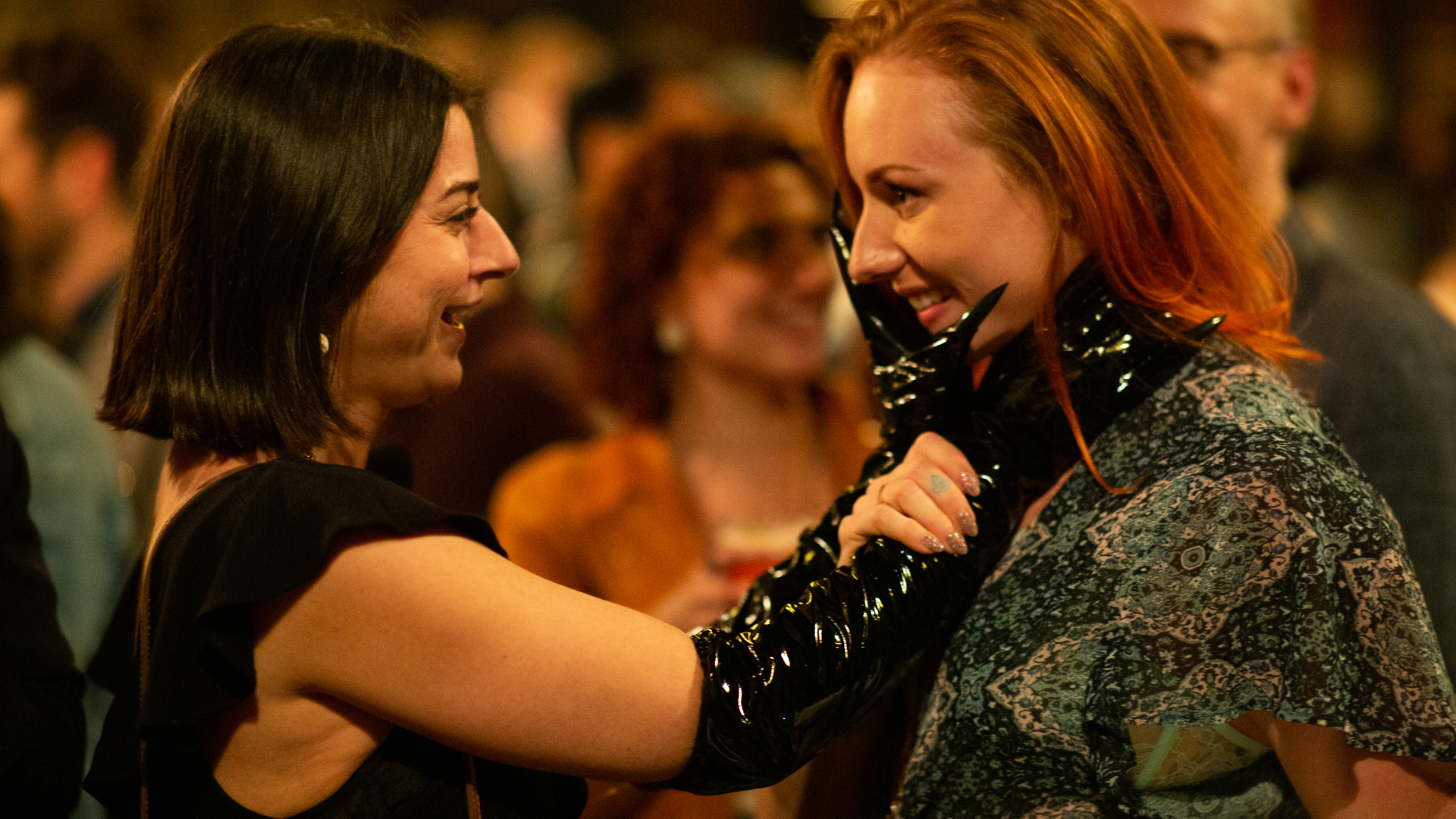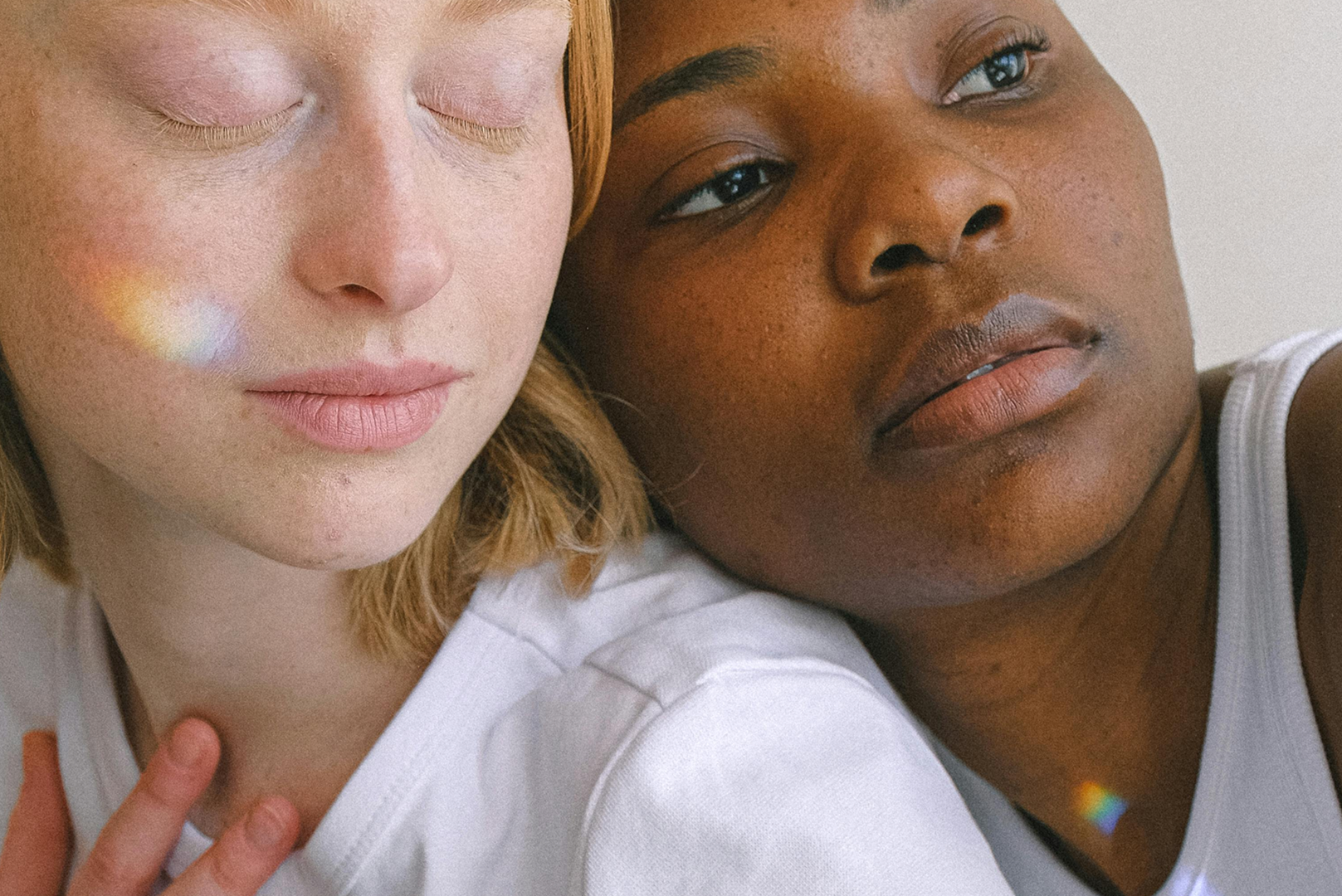Heteroflexibility explained: A deep dive into the “mostly straight” identity

Heteroflexibility is one of many sexuality options available on Feeld. But where did it come from, and what does it mean?
You’re mostly straight, but you also don’t want to rule out same-gender attraction. Maybe you’ve felt it more than once, or you’ve had a moment that made you pause and go: huh. If that sounds familiar, you might be circling a word that’s gotten a lot more attention lately: heteroflexible.
At its simplest, heteroflexible usually means someone who primarily identifies as straight, but is open to (or sometimes experiences) attraction to the same gender. That attraction might be rare, situational, or not something they actively seek out—and it might hinge on openness more than anything else.
And it’s not just theoretical. Feeld Raw 2025—our annual data deep dive—found that heteroflexible is the fastest-growing sexuality on Feeld, with the number of people choosing the label increasing by 193% over the past year. That’s a lot of people looking for language that fits better than “not fully straight.”
With that, we wanted to take a closer look at the term. Where did it come from, and how does it differentiate itself from other, arguably similar, ways of defining ourselves, such as bi-curious, bisexual, and pansexual? Let’s take a look.
The history of heteroflexibility
If heteroflexible feels like a relatively new word, that’s because it is. The term is generally thought to have gained traction in the early 2000s, often in U.S. college spaces and early online conversations about sexuality. These were places where people were talking more openly about attraction, questioning old assumptions, and trying out new language to describe experiences that didn’t quite fit existing labels.
For a lot of people, “straight” felt too final. But “bisexual” didn’t always feel right either. Heteroflexible emerged to describe that in-between space: a way of saying “mostly straight,” without assuming that “mostly” means “always.”
It also reflects the idea that attraction exists on a spectrum. On the Kinsey Scale, which presents sexual orientation on a seven-point scale, rather than as a set of distinct categories, people who identify as heteroflexible often place themselves around a 1 or 2—primarily heterosexual, with some same-gender attraction or openness.
Because heteroflexibility involves attraction beyond strict heterosexuality, some people see it as part of the wider LGBTQ+ spectrum. For others, the label feels adjacent rather than central. Whether someone identifies as LGBTQ+ often comes down to personal experience, community, and what feels the most true for them.
What that looks like in real life varies. In the Feeld community, people describe heteroflexibility in different ways: being open to same-gender sex in certain contexts but not others, or feeling sexual but not romantic attraction to the same gender.
That same spectrum-based way of thinking also makes room for contrasting terms like homoflexible, which is often used to describe people whose attraction is primarily toward the same gender, with occasional attraction to a different gender.
Heteroflexible vs. bisexual, bi-curious, and pansexual
These labels get talked about together a lot. They can overlap, they can blur into each other, and perhaps the real difference comes down to how something feels to the person using the word.
We’ve already touched on how heteroflexible generally means someone is primarily straight, but open to attraction to the same gender. Bisexual, on the other hand, usually describes attraction to more than one gender as a more consistent part of someone’s identity. Both can include same-gender attraction; the difference is often in how central that attraction feels to someone’s identity and experience.
Bi-curious means that someone is questioning, noticing, or feeling drawn to exploring attraction to multiple genders, without necessarily wanting to claim that desire as an identity yet. Curiosity doesn’t always lead to action, and it doesn’t have to. Heteroflexible tends to signal something a bit more settled than curiosity alone: not just wondering, but recognizing a pattern of openness or desire, even if it’s limited.
Pansexual means attraction to people regardless of gender. That’s different from heteroflexibility, which skews more toward different-gender desire, with occasional same-gender attraction. Gender still plays a role in how attraction shows up for heteroflexible people, but it just isn’t an absolute boundary.
People may choose between these labels for all kinds of reasons: how strongly or frequently their desire shows up, what feels emotionally true or socially safe, or what community they’re most connected to. Some people avoid “bi” because their attraction to the same gender feels too rare. Others avoid “heteroflexible” because they feel their attraction is bigger than “mostly straight.” None of these labels are right or wrong, or anybody else’s business. What matters is where you feel you land on the expansive, beautiful human spectrum of attraction.
Does the term “heteroflexible” contribute to bi-erasure?
Some people argue that heteroflexibility can contribute to bi-erasure—the tendency to ignore, minimize, or invalidate bisexuality—especially if it’s used to avoid the stigma that still comes with identifying as bi. In cultures and spaces where bisexual people are stereotyped as confused, promiscuous, or “not real,” choosing a label that sounds closer to straight can sometimes feel safer— while still leaving room for attraction beyond it.
But for many people, it’s simply the word that fits best. Their attraction to the same gender feels real, but rare or situational, and “bi” doesn’t feel quite right. They’re not making a statement about anyone else’s identity, they’re just trying to describe their own as honestly as they can.
What this really shows is how much language is shaped by the world we live in. Stigma, visibility, and social comfort can all play a role in which words feel possible to use, and why choosing a label can be about more than just attraction alone.
How common is heteroflexibility?
Almost 8% of Feeld members identify as heteroflexible. But here’s the thing: some people experience “mostly straight” attraction without ever using the word heteroflexible. Others use it to signify being open in theory, while some use it because they’ve acted on that attraction. Add social stigma, fear of judgment, different interpretations of the label, and the fact that no one owes anyone a label at all, and it can be hard to pinpoint the numbers. That said, what we can see is momentum.
As well as heteroflexible being the fastest-growing sexuality on Feeld, switching between straight and heteroflexible is one of the most common sexuality shifts we see on the app—as highlighted in our Feeld Raw data. Of those who identify as heteroflexible, almost two-thirds are Millennials (65%), followed by Gen Z at 18%, and Gen X at 15.5%, suggesting that this isn’t limited to younger generations.
Dr. Luke Brunning—Lecturer in Applied Ethics at the University of Leeds, specializing in the philosophy of love, sex, and relationships, and a collaborator on the Feeld Raw report— sees this growth as part of a wider cultural shift. As he puts it: “For some, heteroflexible will describe accurately how they experience attraction or typically behave. For others, it might be more of a promise-to-self, something they want to look into further, explore, or which they hope they will be in a position to experience in the future.”
In that sense, heteroflexibility can describe how someone already relates to attraction, or how they might be leaving space for curiosity.
For some people, that recognition is immediate. As Feeld member Josh, 38, shared: “I knew I identified as heteroflexible before I joined Feeld. I was happy when I saw it as an option.”
For others, the label comes into focus later. An anonymous 29-year-old Feeld member described starting out differently: “I was originally marked as straight but then discovered heteroflexible and felt it explained who I am more accurately.”
And for many, it isn’t a one-time decision at all. Tabitha, 29, another Feeld member, explained: “I have switched my sexuality on Feeld a few times between ‘bisexual,’ ‘heteroflexible,’ and ‘bi-curious’ just to see which one felt the most authentic. I go through phases of feeling more secure in my sexual preferences and in those moments I switch to ‘bisexual,’ but ultimately always find myself reverting to ‘heteroflexible.’”
These experiences show that labels are often less about reaching a final destination, and more about having the freedom to move between them as self-discovery constantly evolves. Whether on an app, IRL, or both. Read more about Feeld members’ perspectives on heteroflexibility, bi-curiosity, and everything in between.

How do I know if I’m heteroflexible?
If any of this resonates, then you might consider whether heteroflexible feels like an accurate label for you.
Beyond occasional same-gender attraction, maybe you have fantasies, crushes (real or fictional), have experienced a connection that caught you off guard, or notice a curiosity that keeps resurfacing. And just because it isn't there all the time, or isn't as prevalent, it doesn't mean that it's not real.
Those experiences don’t need a label to be valid. Plenty of people notice attraction without ever naming it. But for some, heteroflexible is a helpful way of describing something that feels more accurate than “completely straight,” without the pressure to claim a different identity that doesn’t quite fit.
A gentle place to start is by checking in and asking yourself a few questions, like:
- Have you ever felt attraction—emotional, romantic, sexual, or aesthetic—outside the gender you usually date?
- Did those feelings feel occasional, situational, or recurring?
- Would you feel open to exploring that attraction if the right person or context came along?
- Does “mostly straight” feel closer to your experience than “always straight”?
- When you imagine calling yourself heteroflexible, does it feel recognizable, uncomfortable, neutral, relieving, or something else?
There are no correct answers. Attraction doesn’t have to be acted on to be real, it doesn’t have to look or feel the same across genders, and it doesn't have to be forever.
Sexual identity is more flexible, expansive, and self-defined than ever before. Labels like heteroflexible and bi-curious give people language for that fluidity, offering ways to express openness without pressure to overcommit or explain more than they want to. To explore how this looks in real life, we spoke to Feeld members about how they discovered these labels, and what they mean to them.
Heteroflexibility is just one of the many labels describing an experience that shows up in lots of different forms. For some people, it means being mostly straight with a few exceptions. For others, it’s about openness, curiosity, or attraction that only appears in certain moments or with certain people.
And you definitely don’t have to figure everything out at once. What matters is that you get to move at your own pace, lean into your curiosities, and choose the label, or no label, that feels right for you.
Wherever you are in your journey, taking time to understand your desires can deepen your connection to yourself and others. Whether you’re exploring heteroflexibility as an identity on your profile, or connecting with others who resonate, we’re waiting for you on Feeld.


